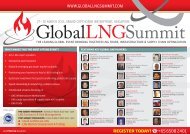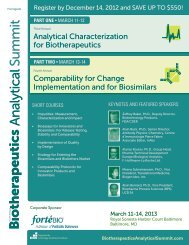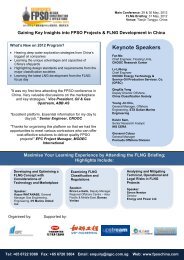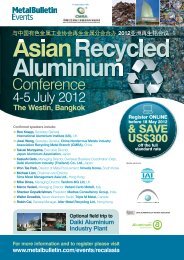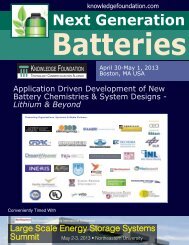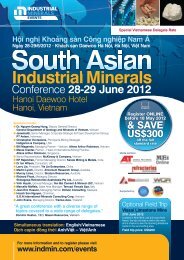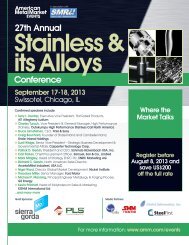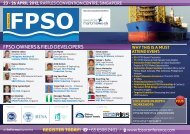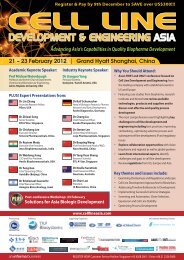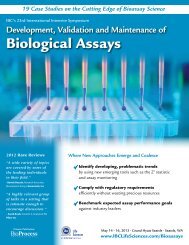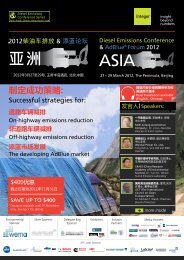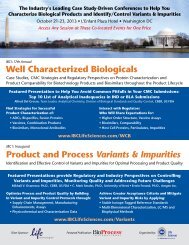Full Conference Details Inside
Full Conference Details Inside
Full Conference Details Inside
Create successful ePaper yourself
Turn your PDF publications into a flip-book with our unique Google optimized e-Paper software.
10:15<br />
10:45<br />
11:15<br />
Enhancing Manufacturing<br />
and Development Efficiency<br />
Single Use and Simplicity – Three Years<br />
in at Shire HGT<br />
Paul Slaman, Associate Director, Manufacturing<br />
Technical Services, Shire Human Genetic Therapies<br />
Cleaning Validation Challenges<br />
for Bioprocesses: Leveraging<br />
Cleaning Characterization to<br />
Streamline New Product Launches<br />
Tuesday, October 9, 2012<br />
CASE STUDY<br />
UNPUBLISHED<br />
DATA<br />
Strategies for addressing cleaning validation<br />
challenges for bioprocesses will be presented. The<br />
strategies are rooted in systematic and proactive<br />
approaches to cleaning. Several approaches, including<br />
performing small-scale cleanability studies to minimize<br />
at-scale cleaning validation studies, the use of master<br />
soils to streamline and provide flexibility for scheduling<br />
cleaning validation activities, and leveraging inactivation<br />
studies to obviate the need for product-specific assays<br />
and MAC assessments, will be discussed.<br />
Rizwan Sharnez Ph.D., Principal Engineer,<br />
Process Engineering, Amgen Inc.<br />
Co-authors: Michelle Monk, Laura Klewer,<br />
Chris Flint, Arun Tholudur Ph.D., Amgen Inc.<br />
Optimizing Changeover in a Large<br />
Scale Multi Product Bioprocess Plant<br />
MedImmune’s Manufacturing Center in Frederick,<br />
Maryland recently transitioned from a steady,<br />
single product facility to a fast-paced, clinical/<br />
commercial multiproduct facility. Senior<br />
leadership challenged the site to optimize change<br />
over from its early cycle time of 28 days to 14 days<br />
or less. Join us to review the cross-functional work<br />
and operational excellence tools that successfully<br />
drove change over optimization.<br />
Chad Briggs, Senior Manufacturing Manager,<br />
MedImmune<br />
Product Lifecycle Planning:<br />
Innovative Solutions to Meet<br />
Quality and Process Challenges<br />
Life Cycle Management - A Case<br />
Study Using a Novel Protein<br />
Eli Lilly has built, qualified and validated a new<br />
state of the art facility in Kinsale, Ireland. The<br />
subject of this presentation is a novel protein that<br />
was the first molecule validated in this facility. The<br />
talk will highlight the approach taken to incorporate<br />
the new FDA guidance document and current<br />
European perspectives and the business drivers of<br />
global supply chain on process validation, the quality<br />
systems for lifecycle management and discuss the<br />
approach being taken for continuous verification.<br />
Graham McCartney, Ph.D., Technical Services Lead<br />
Biotechnology, Eli Lilly S.A., Ireland<br />
Considerations and Challenges<br />
when Evaluating Vials and<br />
Stoppers as Part of Parenteral<br />
Product Container Closure System<br />
Selecting vial and stopper combinations<br />
with optimal fit can be challenging. Issues during<br />
manufacturing can negatively impact process<br />
productivity and timelines, and proper closure<br />
integrity is of utmost importance. Data will be<br />
shown which demonstrates such challenges and<br />
recommendations will be made on how to evaluate<br />
material attributes and dimensions in order to<br />
implement proper control strategies.<br />
Melissa D. Perkins, Ph.D., Senior Director,<br />
Drug Product Sciences, Human Genome Sciences, Inc.<br />
Strategies for Continued Process<br />
Verification – A Lifecycle Approach<br />
to Quality by Design (QbD) and<br />
Process Validation<br />
CASE STUDY<br />
CASE STUDY<br />
UNPUBLISHED<br />
DATA<br />
CASE STUDY<br />
UNPUBLISHED<br />
DATA<br />
As per the new FDA process validation guidance, the<br />
third validation stage describes a lifecycle approach to<br />
continually assure that the process remains in a state<br />
of control (the validated state) during commercial<br />
manufacture. This presentation will describe strategies<br />
and approaches to implementing a continuous<br />
monitoring and continuous improvement program<br />
consistent with QbD principles applied to earlier stages<br />
such as process design.<br />
Kumar Dhanasekharan, Ph.D., Associate<br />
Director, Process Sciences and Technology,<br />
Genzyme, a Sanofi company<br />
Analytical Technologies<br />
for Biopharmaceutical<br />
Development<br />
Developing an Extractable/<br />
Leachable Program<br />
E&L studies are a required part of license<br />
pplications, but can be challenging for biotech<br />
companies due to lack of infrastructure and<br />
experience. In addition to testing of container<br />
closure materials, the evaluation process at HGS<br />
included a risk assessment for contact materials of<br />
the manufacturing and filling processes to determine<br />
which additional components required testing.<br />
Studies were performed utilizing a combination of<br />
external services and a buildup of internal capabilities.<br />
Helmut Schneider, Ph.D., Principal Scientist,<br />
Analytical Sciences, Human Genome Sciences, Inc.<br />
CASE STUDY<br />
Automated Analytics, Data<br />
Reduction, and Data Management<br />
In order to meet the demands of high sample<br />
numbers and large amounts of data in short<br />
periods of time produced in the Automated<br />
Analytical laboratories, we have developed, and<br />
are evolving, a work stream for sample submission<br />
and tracking, analytical quality, and data<br />
management that requires less "hand-on" time to<br />
allow analysts to focus more time in the labs.<br />
Kristine M. Kearns, Senior Research Biochemist,<br />
Vaccine Analytical Development,<br />
Merck and Co., Inc.<br />
Preliminary Characterization<br />
of a Novel Class of Multi-Specific,<br />
Multi-Valent Therapeutic<br />
Zybodies are a novel class of multi-specific<br />
antibodies that consist of short molecular<br />
recognition domains fused to the termini<br />
of mAbs. The presentation will discuss the<br />
expected attributes and behavior of Zybodies,<br />
the analytical approaches and challenges used<br />
to monitor them, along with a comparison to<br />
mAbs and other bispecific molecules.<br />
Rajesh Krishnamurthy, Ph.D., Director,<br />
Pharmaceutical Development, Zyngenia, Inc.<br />
Antibody Drug Conjugate<br />
Development & Production<br />
Antibody Drug Conjugate Process<br />
Development Considerations<br />
Mark Itterman, Senior Manager, Process<br />
Development, Millennium Pharmaceuticals, Inc.<br />
Approaches to Improve Efficiency<br />
and Speed to the Clinic for Antibody<br />
Drug Conjugates<br />
John Moscariello, Ph.D., Principal Scientist,<br />
Purification Process Development, Amgen Inc.<br />
Regulatory Considerations for the<br />
Manufacture, Characterization and<br />
Quality Assurance of Antibody-Drug<br />
Conjugates<br />
Since the first IND for an antibody-drug conjugate<br />
(ADC) was submitted almost 20 years ago,<br />
only two ADCs have been approved; Mylotarg<br />
in 2000 and Adcetris 2011. During that time,<br />
improvements in the conjugation chemistry result<br />
in ADCs with improved serum stability. New and<br />
improved analytical methods allow a more precise<br />
characterization of the ADC. This presentation<br />
will focus the regulatory approach to ADCs from<br />
the drug and biologics review perspectives.<br />
Marjorie A. Shapiro, Ph.D., Chief, Laboratory<br />
of Molecular and Developmental Immunology,<br />
Division of Monoclonal Antibodies, US FDA<br />
11:45 Concurrent Technology Workshops<br />
What’s Next in<br />
Meeting Marketplace<br />
Single-Use Vs.<br />
Early Process Development<br />
Fed-Batch Cell Culture?<br />
Needs - Rapid<br />
Multi-Use Equipment:<br />
Integrating Chemically<br />
The history of fed-batch as a method of producing Development of Robust<br />
An Environmental Life Cycle Assessment Defined Supplements and Feeds<br />
proteins in CHO cells is remarkable with respect to<br />
the progress made in a relatively short period of time.<br />
Within the past decade we have progressed from<br />
IgG titers in the milligram per liter range to current<br />
routine yields of multiple grams per liter. The latter<br />
have been achieved by both sophisticated feeding<br />
strategies and cell line engineering. This workshop<br />
will provide data related to recent improvements in<br />
the various elements that impact fed-batch culture<br />
and how one can maintain flexibility in scale-up<br />
Peggy Lio, Senior Process Science Fellow, Gibco®<br />
PD-Direct Bioprocess Services, Life Technologies<br />
Manufacturing Processes<br />
As the biopharmaceutical industry matures,<br />
outsourcing has become an integral part of production<br />
strategies including a shift towards the outsourcing<br />
of research and process development activities. For<br />
contract manufacturing organizations, innovation and<br />
providing custom solutions has become ever more<br />
important. We will outline aspects of our current<br />
process and analytical development activities to meet<br />
the needs of the biomanufacturing market.<br />
Greg Adams, Ph.D., Section Leader, Analytical<br />
Development, Fujifilm Diosynth Biotechnologies<br />
of an Entire mAb Production Process<br />
This cradle-to-grave environmental study compares<br />
single-use vs. traditional process equipment for<br />
the production of monoclonal antibodies at 100L,<br />
500L and 2000L scales. The study results show<br />
that, for the conditions explored in this study,<br />
the single-use process technology exhibits lower<br />
environmental impact by reducing or eliminating<br />
the need for large quantities of steam, process<br />
water, and water for injection.<br />
Jeffrey Carter, Ph.D., Director of Research &<br />
Development, GE Healthcare Life Sciences<br />
Elizabeth C. Dodson, Ph.D., Advanced<br />
Bioprocessing, BD Biosciences<br />
12:15 Luncheon Presentation<br />
“Open Sourcing” – Increasing Options to Meet the Challenges of Drug Development and Manufacturing<br />
Developing and implementing a manufacturing process for clinical scale material involves many steps, requiring knowledge, expertise and resources. In this presentation we introduce the concept<br />
of “Open-Sourcing,” an alternative view of how such knowledge, expertise and resources can be accessed and delivered to speed the journey to the clinic. This presentation will highlight through a<br />
case study how a solutions-based approach enabled the development of a clinical manufacturing process for a new drug in parallel with the construction of a new clinical manufacturing facility.<br />
Richard Pearce, Director of Strategy Development, BioPharm Process Solutions, EMD Millipore<br />
Sponsored by:<br />
9 To Register, Call: (800) 390-4078 • Fax: (941) 365-0104 • E-mail: reg@ibcusa.com • www.IBCLifeSciences.com/BPI



